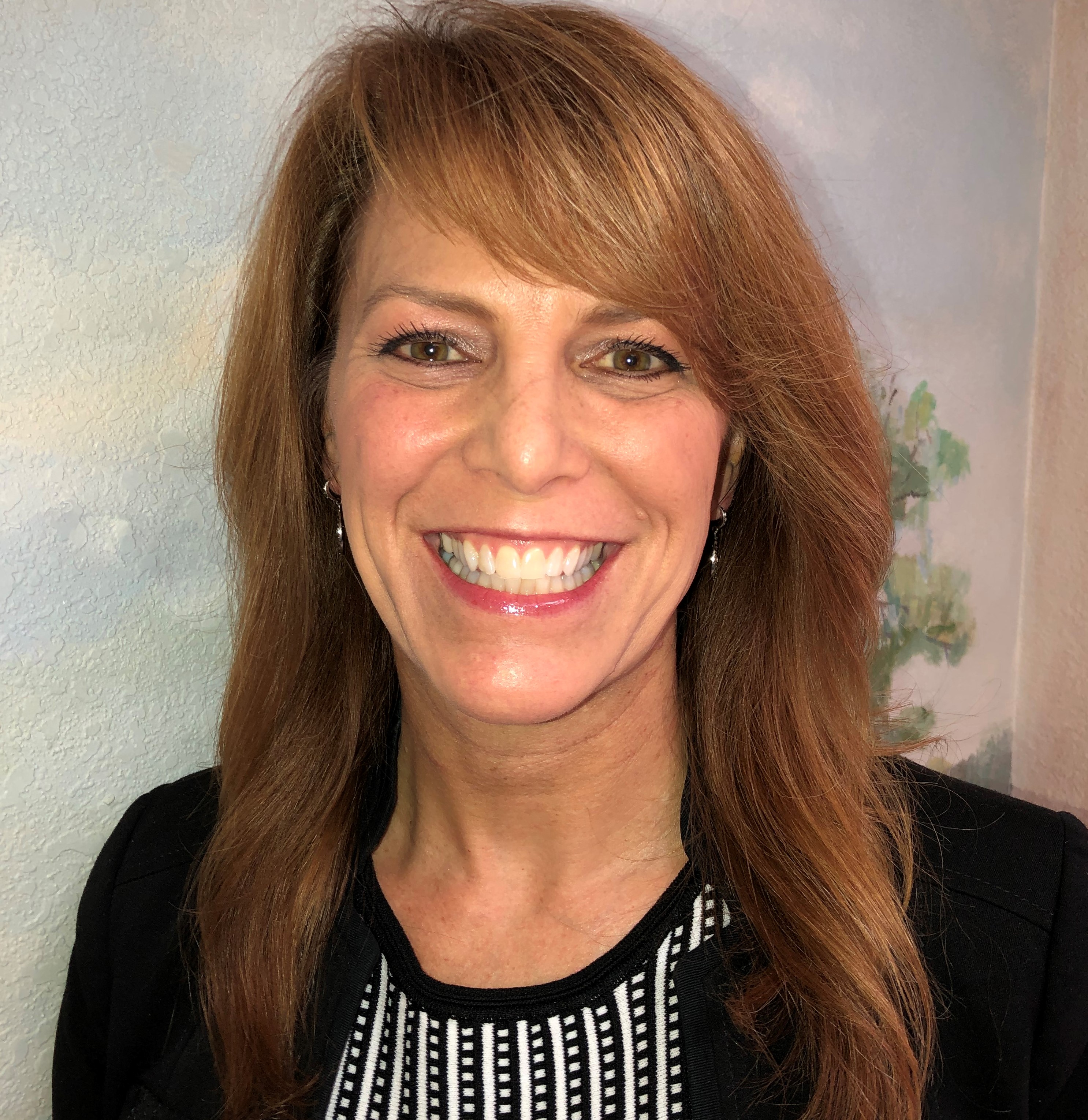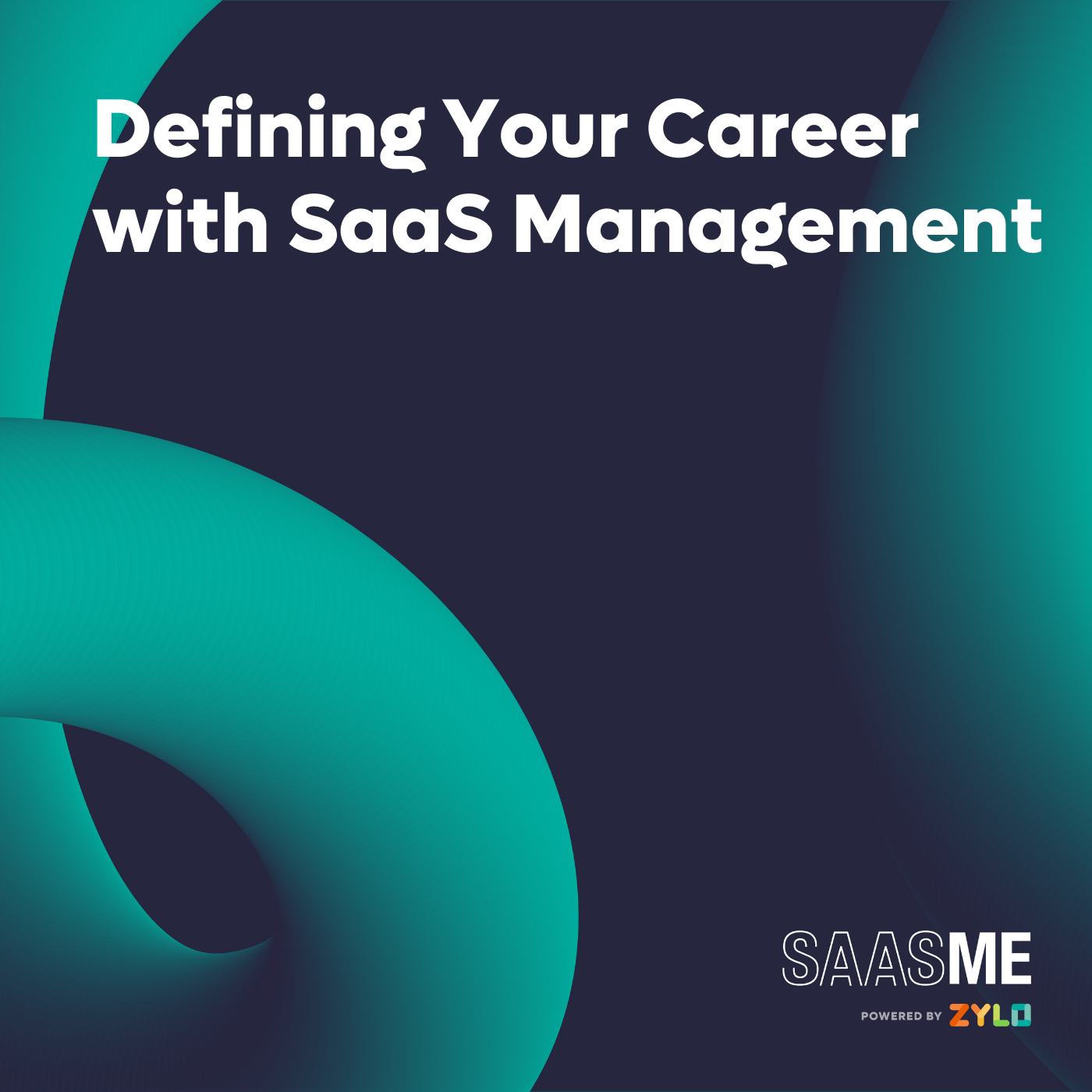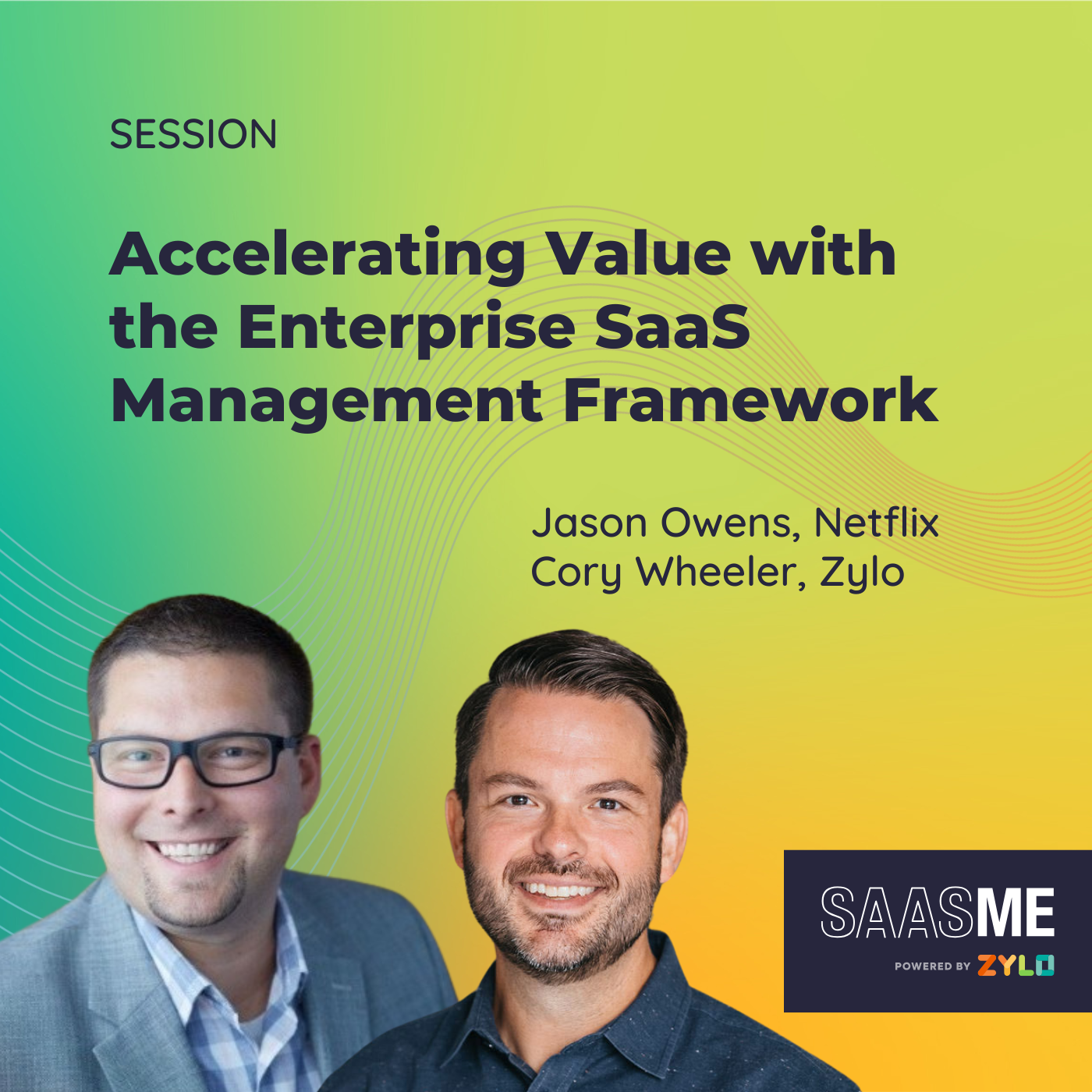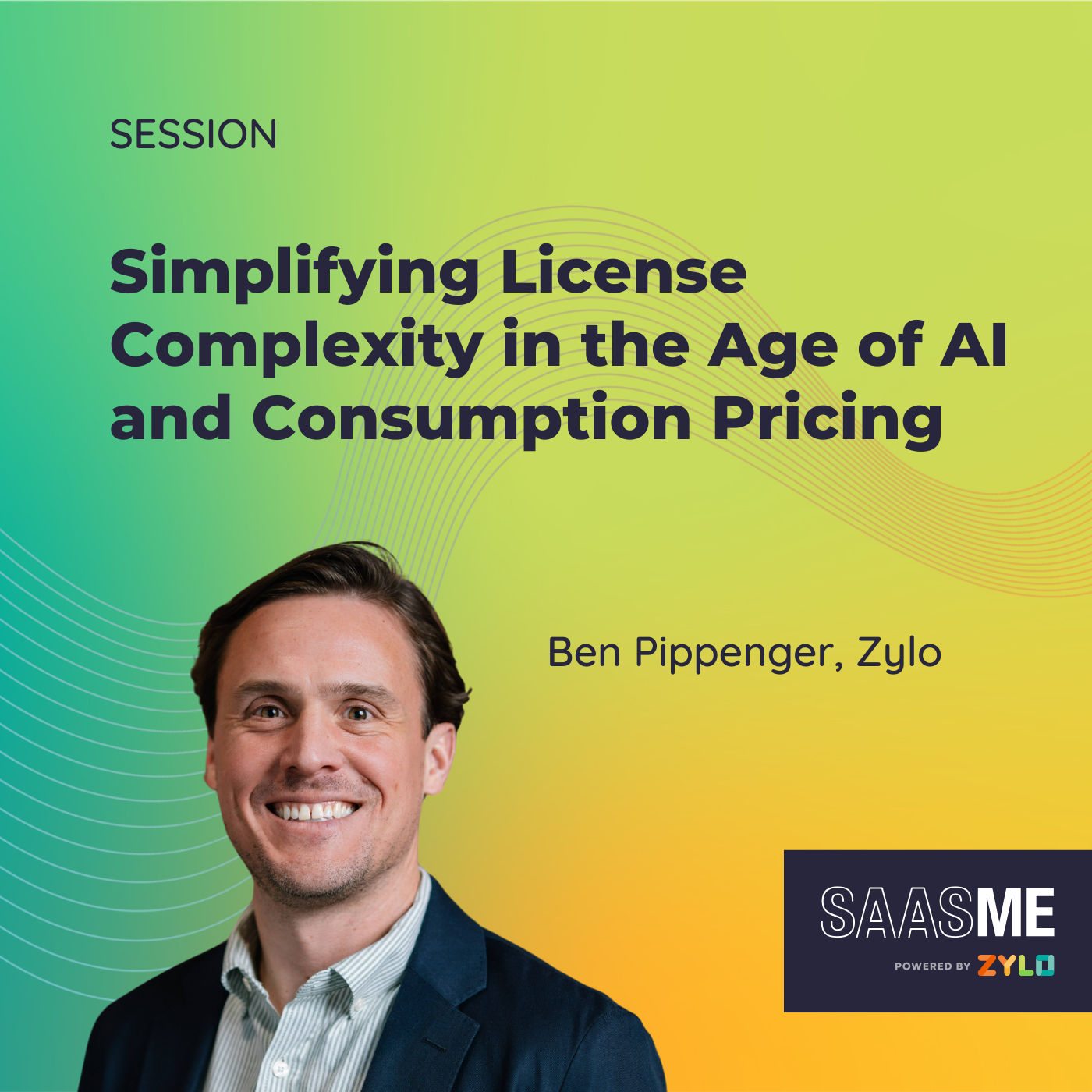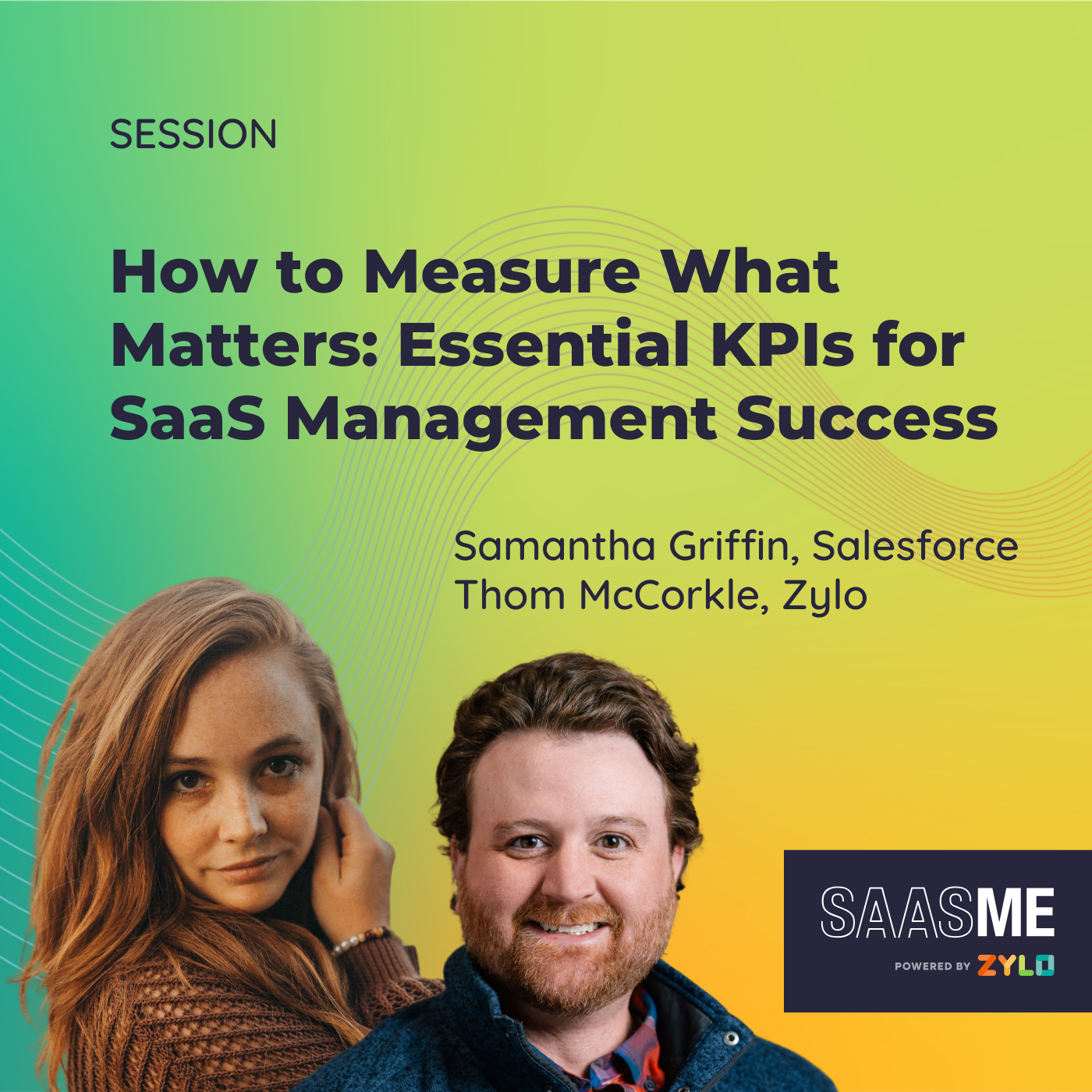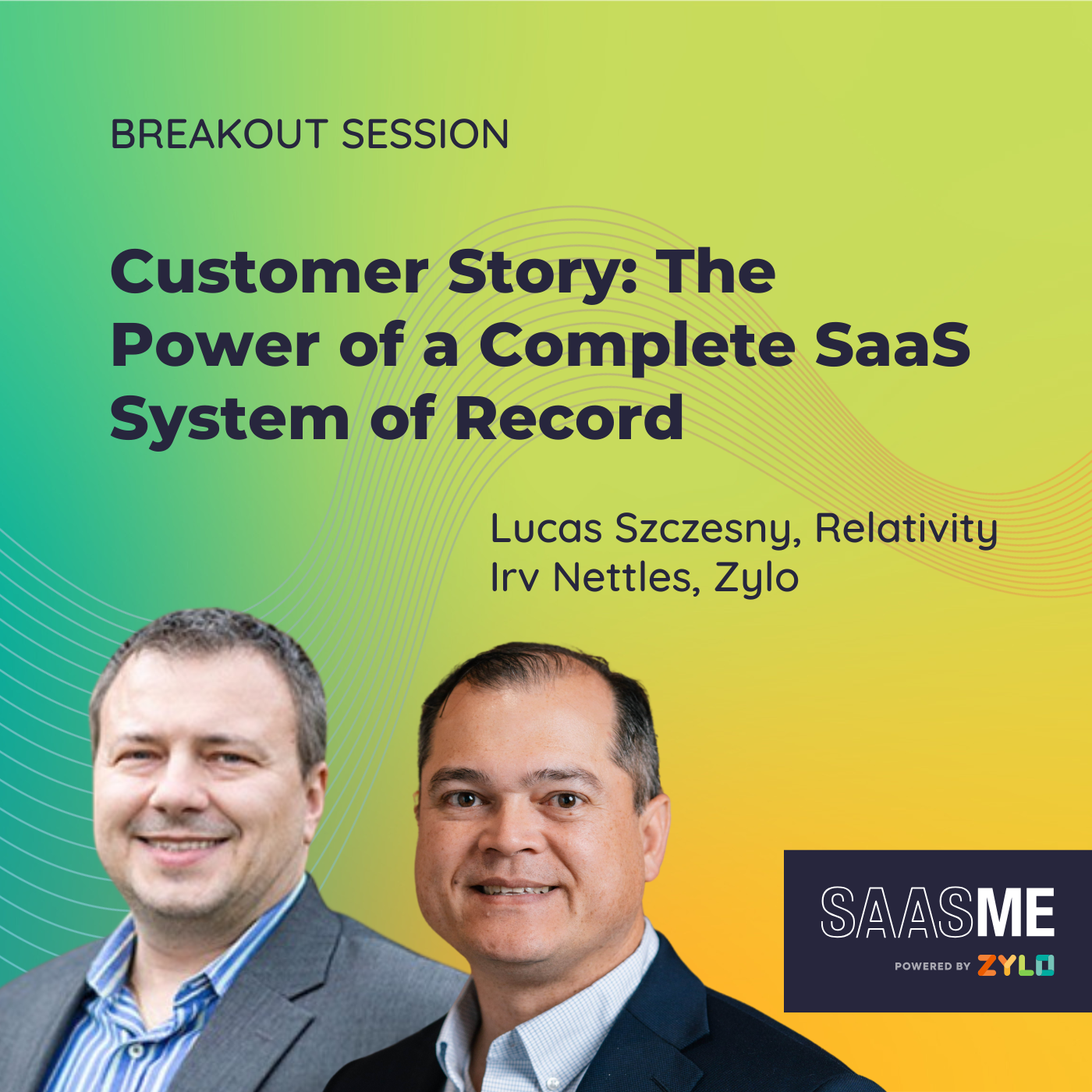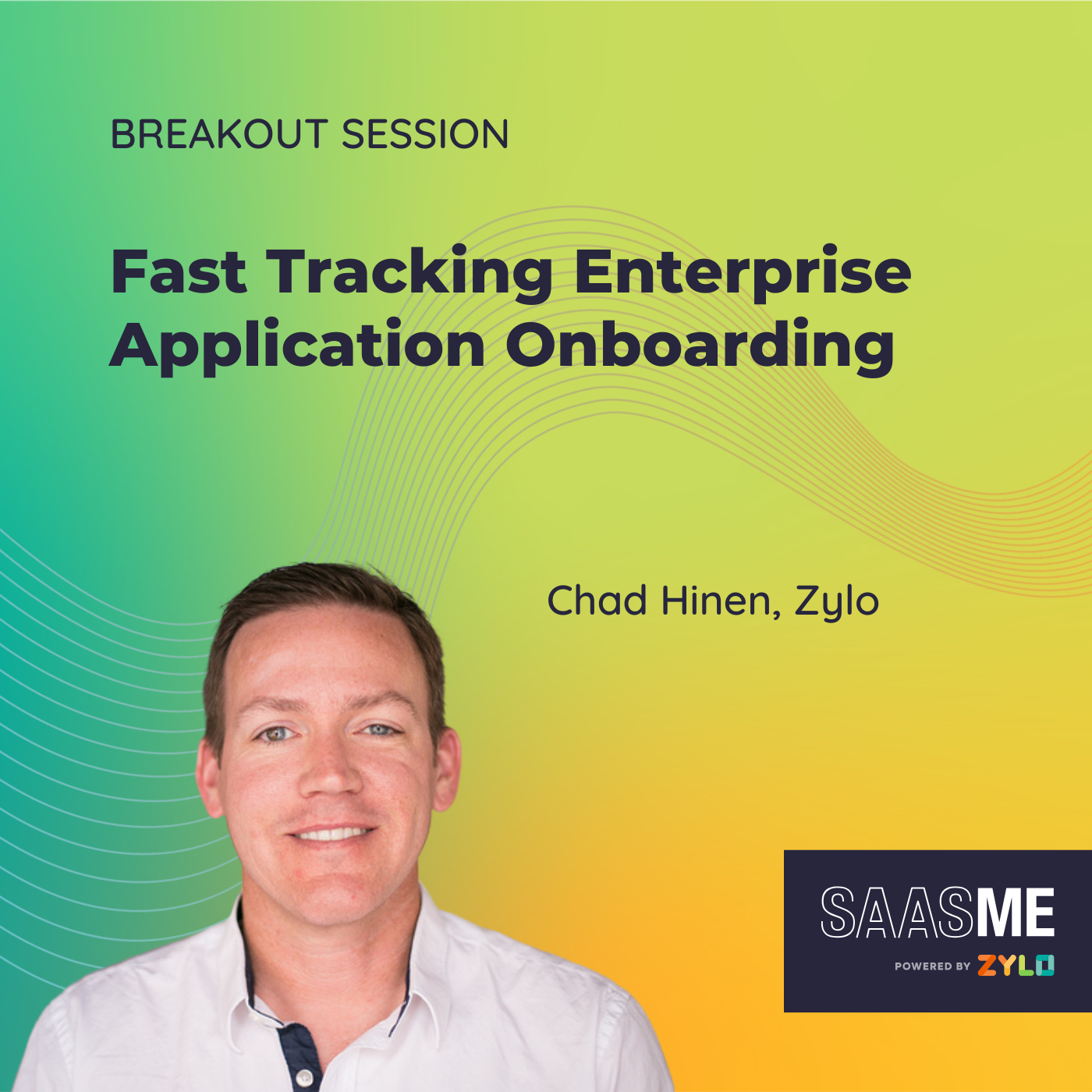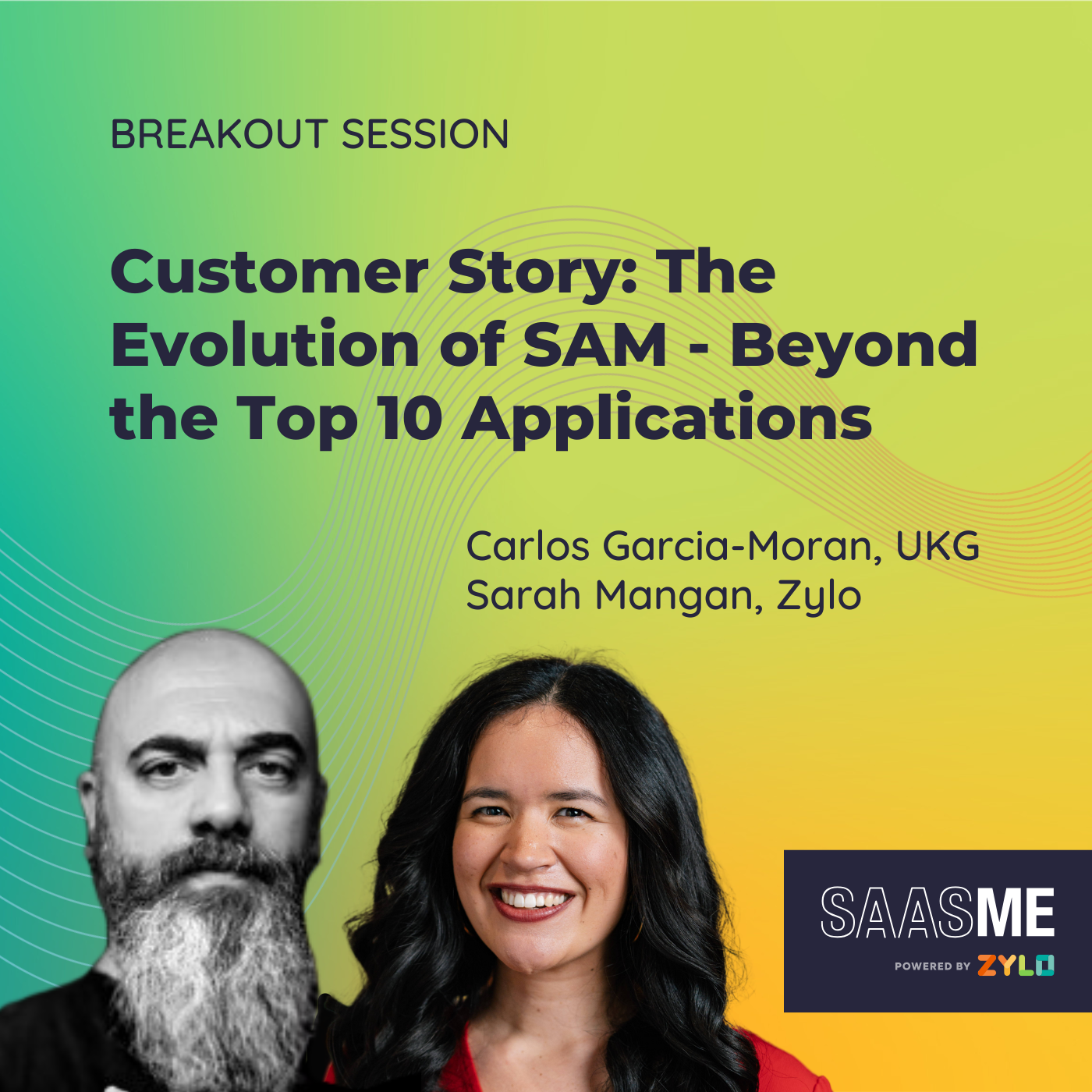Defining Your Career with SaaS Management
- 0.5
- 1
- 1.25
- 1.5
- 1.75
- 2
Ellen: Hi, everyone. Welcome. I'm Ellen Humphrey, I'm the Chief People Officer of Zylo and I am so excited to host this panel with you today. I've got the power panel on defining your career with SaaS management. Just a reminder, feel free to submit your Q& A through Zoom Q& A feature panel or through the chat. We'd love to have your real time feedback and hopefully, we'll have some time to address that. Again, very excited to have this panel with me today. I've got three rockstar SaaS management professionals here. I have Samantha Emrick. Sam is the software asset manager at Genesys. I've got Leah Tubb program manager, IT strategy and business operations at Atlassian. And we have Renee Turco, technology asset management manager from AbbVie. Thank you all for being here. So excited to get started. So let's take this deck off so you can see our brady bunch view and just dig into the conversation. I'm going to start with just asking each of you to talk through your backgrounds. Tell me how you ended up in your current role, what led you there and let's start that conversation with you, Renee. Tell us your story, I know each of you have some really unique things on how you ended up where you are.
Renee: Sure. So I've been in IT at the various number of roles for more than 30 years. So back in the days of a lot of on- premises software, I originated in a very technical perspective with my career. Managing desktop technologies, servers, data centers, networks, et cetera. And I had a turning point back in 2004 when I had to lead very first audit in my career with Microsoft, go big or go home, I guess, is how you might look at it with Microsoft being first audit. And that's when I decided I wanted to do more than making sure systems were up 99. 999% of the time. I wanted to influence more value into the business, still with IT. I love what I do but after that audit, I really became much more involved with software asset management which eventually then led into other contract roles, vendor management, outsourcing and sourcing roles. And now I've come full circle back to technology asset management. So our team provides a lot in the realm of data and compliance both for on- premise and for SaaS management.
Ellen: That's awesome. Thank you. Kudos to you, 30 years in IT. Congratulations. Leah, how about you?
Leah: Well, I went to school for Materials Engineering and for anyone that knows Materials, it's a very technical field and you're generally in a lab in a bunny suit. And I learned very quickly, I didn't want to be in a lab in a bunny suit and I loved working with teams. I loved doing organizations with the teams and working on governance and practices and figuring out how to move the teams forward. So I knew program management was the field I wanted to go into and I went and worked for the US Navy for a couple years. We did Navy ship testing and it was thrilling and it was exciting, a lot of PowerPoint though. Everything sounds better on paper. And at that point I realized I wanted to get into tech and so I went and did sales operations and business operations for a technology firm. And then I found Atlassian and I found my role as an IT strategy and business operations program manager. And it really is the best fit of operations, program management, working with portfolios, working with money, working with people and it's just a lot of moving stuff forward and bringing people together.
Ellen: Thanks. That's an interesting path that you had and I love talking to people and hearing their stories about how they landed in technology because not all of them are like Renee, where it was just from the beginning, always there so that's exciting. All right, Sam, round us out. Tell us your story.
Sam: All righty. My name's Samantha Emrick, I've been with Genesys for about six years now. Interestingly enough, I started out on our sales team. I was on the very first team that was selling our full Cloud offering. So my foundational understanding of the Cloud licensing space was pretty strong and we saw a lot of success with that offering. And then ultimately, Genesys ended up pursuing a need for a procurement team and I ended up moving over to there. Given the understanding of the license based pricing models, I did a lot of our software negotiations, things of that nature. And then after about a year or so of that, we uncovered a need. When you're able to really be honest with yourselves about how licensed utilization is working within the organization, you really see how individually managed a lot of the different applications can be and how sometimes it makes sense to go to a more centrally managed offering. And so I moved into the software asset management role from there about two years ago.
Ellen: Yeah. And you've given a preview to what the next session at Saas is going to be because there's going to be a whole section on centralized versus decentralized. So it sounds like Genesys is moving on that journey for sure. Thank you. Three professionals coming from three totally different areas, I love that and I think that's the theme of today is the definition of your career and I'm saying your, all of you who are listening and participating can come from so many different angles. And I think that's some the excitement I have as an HR professional, as someone interested in people in what this is going to look like. All right, let's talk about your organizations for a moment. All three of you are again, you're from very different organizations. Tell me about how your organization defines SaaS management and how that has evolved in your time with your organization? And Leah, let's start with you and tell me about Atlassian.
Leah: Sure. So in Atlassian IT we're 99% Cloud. We have very few on- prem instances and most of them are due to conference centers and we're on the path to be a hundred percent Cloud. And it was really neat, we actually, had our quarterly review with our CIO last quarter and she was asking," Why aren't we a hundred percent? We need to get there." So that's the path that we're on. And for SaaS management at our company, it's really grown in the past six months. I joined Atlassian six months ago and was really encouraged by my management chain to," Hey, maybe you should dig into SaaS here." And it's been really fun because it's a big, we call it the onion that we keep peeling back and keep finding more and more. And so we're looking right now to organize how we do at Atlassian and how we look at all of our SaaS because we really allow all of our employees to use whatever tool they want to use to do their best work. So it's working to make sure that we are, that they are compliant with our privacy rules, making sure that we are getting them access correctly, making sure they're spending money in a good way but making sure that our employees are able to do their best work. So we're all working together to just move Atlassians forward when it comes to SaaS management.
Ellen: That's exciting. And those are Atlassians all over the world.
Leah: Yep. So we have team anywhere and what that means is basically, you can work wherever Atlassian has a tax presence and as long as your management chain says, it's okay, then you're good to go. And so I'm working with consistently my colleagues in India, in Manila, in Australia, San Francisco. I'm in Ventura, California but we're all over and we're all connected through the Cloud.
Ellen: Yeah. Again, the rise of SaaS and thus the rise of SaaS management for sure. Thanks, Leah. Sam, how about Genesys? You gave us the teaser with your intro and how you got to where you are. So tell us the view of SaaS management there.
Sam: For sure. So similar to Leah, we are running full speed ahead towards a fully Cloud environment as quickly as we can in the best way that we can. I would say that we're trying to be good stewards of our relationship with all of our stakeholders, understanding that change in trying to view this as a centralized structure versus being so individually and siloed managed in the past is a difficult conversation to have especially, when you get into the nitty gritty from a procurement perspective of," Well, if we want one tool put across the entire organization and we want to be able to utilize those discounts it may not fit a hundred percent of the needs, a hundred percent of the time." So we're really trying to find that balance between what is a best in class tool versus what is a tool that can successfully fit the needs of all of our stakeholders.
Ellen: Okay. Renee, I think your story might end up being a little different from my previous conversations with you. So what does SaaS management look like and how does AbbVie define that?
Renee: Sure. It's significantly different than the other two companies. We have a blend of on- premise and SaaS but we certainly have seen the growth and the trend to move away from on- premise to more SaaS based applications. You can imagine an enterprise as large as AbbVie, you were going to have your typical tier one on premise providers whether that be SAP, Oracle, what have you or a blend thereof of on- premise and SaaS. And AbbVie has a very mature software asset management technology, asset management practice. However, it was just a few years ago that we realized we had all of the tools and all of the practices in place for on- prem. We did not have that to meet the SaaS needs. And that's when our team had run an RFP to understand what's out in the industry, we're seeing this massive growth in SaaS. We need to get our arms around us and eventually we get to Zylo and they've been a wonderful partner of ours. So SaaS management for us from a procurement perspective is, is this being something installed, physical software on a device or is this something we're going to the Cloud that's based on a subscription on an annual basis? But we absolutely, recognized it has to be managed. We're spending money on it, we need to understand what is that consumption. And then after understanding that, how do we provide more insights to our business so that there's more value add because it is continuing to explode in the industry so quickly.
Ellen: Leah, when we were talking earlier, what Renee just said, reminded me about something you mentioned with giving guidance on what was available and you becoming a source point for different areas of Atlassian because you had this broad view. Will you talk about that a little bit?
Leah: Sure. So we have lots of different applications in Atlassian and a lot of people use different tools to get their job done. And so we'll have folks coming to us saying," Hey, what else is in the marketplace? What can I look at?" And I can pull up in our Zylo instance of," Oh, it looks like these are in a similar space as you, do you want to try them? We could work with the admin here, see if you can get a temporary license to try it out." And then I work with our workplace tech team as well to make sure that licenses are being issued correctly and to the right people. And we're pulling them back as needed as well. So it's pretty neat and it's pretty cool when people come and say," I need something to do in this space that does this thing," and having our solution architects work with those people to really find the best fit solutions is really exciting.
Ellen: Yeah. I think that's cool too. That's like a nice benefit that maybe you don't think of immediately when you think of your SaaS management platform.
Leah: Yeah. It also allows us to be cutting edge. I mean, if something new comes out and it's all the rage then folks can go and get it and we can run it through our protocols, make sure it's up to snuff for Atlassian and then they can use it. And we're not setting up crazy barriers of, you need to wait like a year and a half for a procurement cycle. We can move quickly on certain things.
Ellen: Yeah. I love hearing that the platform could help you with speed. That's awesome. Well, this is about defining your career in SaaS management. So let's talk about that for a moment. And Renee, could you start us off? What advice would you give to individuals who want to advance their careers in SaaS management?
Renee: Sure. I mean, I think the theme that we've all been hearing is, it's going to continue to grow. The adoption is there, it's helping companies become more agile, that's great. But now we need to put our arms around, how are we managing that spend, how are we managing the usage and providing that visibility to our business owners so that they can make better decisions? So from a career perspective, there's just a plethora of data out there. It's taking that information, putting it into trends, putting it into a useful business story so that those decisions can be made and people do have that better understanding than they may not even be aware of what they're spending money on. I mean, I hate to say that but I mean, in the SaaS industry on average enterprises are wasting up to 35% of their SaaS spend because it's not being managed. And that's where I think from a career perspective, people can start adding a lot of value and picking backing off of Leah's input companies like AbbVie that are highly regulated don't have the ability to just say," Hey guys, go out there and use what you want." And we do have to be, we have to go through security scrutiny, other application gateways so to speak, before somebody can just start using a new application. Well, it's also understanding," Well, what do I already have in my portfolio?" And taking that information back to your business to add the value and to be more proactive with them. So I'd say from an advice perspective, being able to turn a lot of broad data and information into a cost and applicable business story.
Ellen: That's great. And so I'm hearing you talk and I'm thinking that's business analyst. You weren't talking about go get your technical chops, this is about how can you be a business analyst for the company? I love that angle.
Renee: Absolutely.
Ellen: Yeah. I love that angle. Sam, what would your advice be?
Sam: My advice is a little bit more tactical. I would just say to become an expert in your field and I guess, your field is a little bit too broad but if the tool that you're using every day is Coupa or if the tool that you're using every day is Snowflake even if you're not currently sitting in a Sam roll or a SaaS management role to understand, is your tool user based or is it usage based? Because we're seeing a huge shift in the market, I feel like right now from user to usage and understanding what those pricing models are going to look like for yourself and trying to prepare yourself for those changes internally. And I feel like once you have a solid foundation of about, I mean, five to six of the big key players, you have a good landscape for what the rest of the marketplace looks like.
Ellen: Thank you. Leah, what would your advice be?
Leah: So at Atlassian it might be a little bit different. We're a very, I would say, grassroots organization. So it's very team based and I mean our stock ticker's team. And being a people person, I think really helps me. I think it helps me communicate and connect with all of the different stakeholders because there are so many people that are involved with SaaS management that taking a top down view for it would not go well at Atlassian. So being able to reach out to folks and saying," Hey, I know this is your role. Let's work together, let's partner, this is what the business needs. How can we support you to move this forward?" Has really helped. I think that if I was a person or was in a role where I needed to be very top down and heavy handed, it wouldn't go over well at Atlassian but being the much more of," How can I help you? I want the same thing for you. I want your team to move as fast and as well as possible, let's do it together." And I have found that's the most success for me. The other thing that I want to say is, find out how you work. So this is one thing that whenever I'm asked from young professionals of getting into just business in general, is what's your best recommendation? And mine is find out how you work. So I use Trello for my task management and then I use Pomodoro methods. So I set a timer for 24 minutes and I work for 24 minutes and then I take a break and then I work for 24 minutes and I take a break and it's just keep me on task and to make sure I'm getting my stuff done. And I feel learning that earlier in your career, you can learn different fields and you can move into SaaS management but learning how you work, I feel like is really the baseline.
Ellen: Yeah. Listening to all three of you, I heard collaboration and shades of being able to work across areas and the information and the data that you're providing and back to Renee in that business analyst angle, all of those are super interesting. And the other thing I picked up on was culturally back to the other question of tell me about your organization and how it views SaaS management, that culture of your organization probably, is shaping how your career might move forward in SaaS management too and all of those are super interesting. And I don't know that I was expecting that as much, this is very organization dependent. So thank you for those answers. I think that's interesting to think about your career can also be shaped with how your organization is running their platform. I think we have a few things in the chat and in the Q&A so maybe we can hit one of those before we keep moving.
Brooke: Yeah. The first one is what would you recommend to women starting in their career, looking to follow in your footsteps on a SaaS management career path or journey?
Ellen: I love it. Renee, do you want to start with that one?
Renee: Sure. So what I would recommend for women starting in this field is I honestly, I wouldn't separate it between he, she, them, it's a matter of really focus and understanding what your business is looking for, what we do. And to Leah's point how you work and what makes you most successful. And I'd also, a bit of advice for anybody would be, what don't you like to do? I think sometimes we find ourselves even more so when we discover the things we might be good at but we don't enjoy. And I love the data aspect and being able to provide more of that insight to our business because they know what they want and they know that they want to get there quickly. How do we enable that? So from a woman's perspective, it's been quite a career but I think so many barriers have been broken down in that realm. That confidence just has to come through very clearly and articulate what you want.
Ellen: Thank you. Sam, how would you answer that question?
Sam: I would answer that question by saying, just get your hands on as many tools as you possibly can. I had the luxury of having a Salesforce license from the very beginning of my sales career and a Coupa license when I went into procurement and just a handful of other licenses that I was able to intricately and intimately learn over the course of my career path in Genesys. And it gave me a great foundational knowledge of just the overall SaaS marketplace. And I would say that whether or not you know exactly what direction you want to go, if you have that general foundation of knowledge, it gives you a lot of tools in your tool chest to be able to choose your own path.
Ellen: Awesome. Leah?
Leah: So I really believe in the power of lifting each other up and reaching out to other women and saying," Hey, we're in a similar boat, let's all tides rise." And so even if they're in a different field as you, they may not be in SaaS management but you see a woman who's just kicking ass in her job, reach out to them and say," How do I move forward? This is the goal I want to do, will you help me be a champion?" And also say it to the male mentors in your life as well and say,"This is the path I want to go on," make it clear and say," This is what I want to do." Renee, I loved your comment about you find out a lot about yourself when you don't want to do something. There's an analyst on my team and she's amazing at her role and it is incredible and I know that if anything has bigger than 20 lines, I need to go to her for help because she's just going to do it better and it's going to be a better output for the team. So I think it's really acknowledging that as well as where other people do better and reaching out to them and saying," Hey, great job. Please help me with this too."
Ellen: Yeah. There's a theme of support there which I think I love because none of us do this alone and navigating any career, it takes a lot of people mentoring and I love... I told you it was a power panel because I love the power I heard in all of those answers. Basically, take control, know what you want and don't be afraid to talk about it. So thank you. We have another good one in the chat, Brooke.
Brooke: Yes. If your organization doesn't currently have a SaaS management platform, how do you recommend approaching executive buy- in or what was your first step?
Ellen: Oh, I love that. Sam, do you want to take the first stab at that?
Sam: Yeah. I mean, there's a lot of ways you can go about it. And I feel like anybody who manages SaaS knows that there can be like a lot of shame when you actually, dig into the data and you see that you have 10 different eLearning options and you see that you have seven different project management options. So I think that can be a great place to start, is to start interviewing your stakeholders, finding out what it is that they're using if you don't know what they're using currently. And really trying to build out that tech stack to showcase just how much of a benefit. I mean, we spend a 100,000 on this, 250, 000 on this. And if we were able to consolidate and reduce and have visibility into it, we could save hundreds of thousands if not million dollars a year. And I think that's a great place to start.
Ellen: Yeah. We don't call that shame, we call that discovery, Sam. Come on Renee, how would you answer that?
Renee: Very similarly but from a financial perspective. I mean, I hate to say it money talks. Every company is looking to grow their bottom line. Well, how about if you could reduce your spend by 35% and just in SaaS alone because it's being wasted, are people actually, using what you purchased? You have to have that visibility and to provide that story to the right people and the finances will speak for themselves. To Sam's point, being able to have that leverage to consolidate multiple contracts that might be in existence but starting from the financial aspect, I think would be the place I would recommend starting.
Ellen: Mm- hmm( affirmative). Leah?
Leah: Yeah. I would say start small and build out a case study. You can do a lot with G- sheet. You can pull up your top five or three to five spend apps or utilized apps. Start looking at the leverage, start seeing how many folks are actually, using it. How they're grooming the user list and the admin logs and making sure that they are well leveraged, are the contracts right sized? And start digging into that from a G- sheet and then say," Oh, by the way if we had a tool to bring this all together," and start comparing it instead of looking at five and it taking days at a time and talking to 20 different people, I could probably, do 10 of these in a much quicker way. And I think really just telling the story and starting small could be really beneficial.
Ellen: Great advice. All right. We're quickly going fast through this panel. So let's round this out with, in your view, what is the future of SaaS management? And Renee, I'll start with you.
Renee: So the future, I mean, we are in a new normal, we truly are. And I know that has also been a theme of some of the discussions today but it's a different way of working. It's a different way of managing and understanding what your company's using. So the future of SaaS is that it continues to explode. How are you going to get your arms around it? And how are you going to be agile about it? I love the insight that Leah has provided on how quickly they are able to adopt different applications and the usage around it. That's not necessarily the case here at AbbVie. So I'd say the future of bringing all of that together to make it more palatable to your business owners and providing them that visibility continuously, it is really the future, I think, of SaaS bringing it all together.
Ellen: That one stop shop of visibility is key.
Renee: Yes.
Ellen: Sam, the future of SaaS management.
Sam: The future of SaaS management, I think to piggyback on Renee and Leah, it's crazy how fast you can spin up an instance or start an account with a lot of these really great platforms. I mean, they hire very smart engineers who know exactly what their end users want out of an experience and it's great. And it gives us a lot of opportunity to change and pivot very quickly. But it's also really scary the amount of free trials that anybody in your company can start, the shadow IT, the lack of security review. It's a beast to get your hands around. And I think it's going to keep growing in visibility and I think it's going to keep growing in job needs and job growth. And I think there's going to be a lot to come of it in the next two to five years.
Ellen: Leah, you get the last word on the future of SaaS management.
Leah: Oh goodness. That's a lot to hold. It's getting bigger, I mean, everyone is moving to the Cloud. You hear companies that are traditionally on- prem and it's more resilient to be in the Cloud in a lot of ways. If your one data center goes down, you can be in big trouble but if there are 10 others that are simultaneously working to support that product, you can keep on rolling. And I think that's one thing that we really found this past year with COVID is that you need to be resilient and you need to have companies that can handle this and you need to be able to change and shift too. I think we'll see billing go from users to more platform and usage based and I think that's pretty exciting. I'm excited to see how tools can start managing that from a one stop back instead of being directly in the tool, managing it that way. Looking at where's all my money going and seeing who's using it, who's using it when really exposing that shadow IT that Sam talked to. We need to protect our company and getting our hands around the security aspects, I think it's going to be huge and making sure that your employees are well versed in what the security aspects are as well. Because we want people to be able to spin it up quickly but we want them to do it smartly.
Ellen: Yeah. It is an exciting field and the three of you and your different experiences and how you're leading the charge. Thank you so much. You were the perfect panelists for this discussion and I wish we could keep talking for 30 more minutes. 30 minutes goes really quickly so I thank the three of you-
DESCRIPTION
With SaaS spending projected to top $120 billion in 2021, SaaS Management has emerged as one of the hottest career paths in enterprise technology. Our panelists for this session have taken various paths to reach success in their current roles. Whether you are a solo practitioner or building a solid team of SaaS Management professionals, this session will offer concrete examples you can follow to advance your own career.
Today's Guests
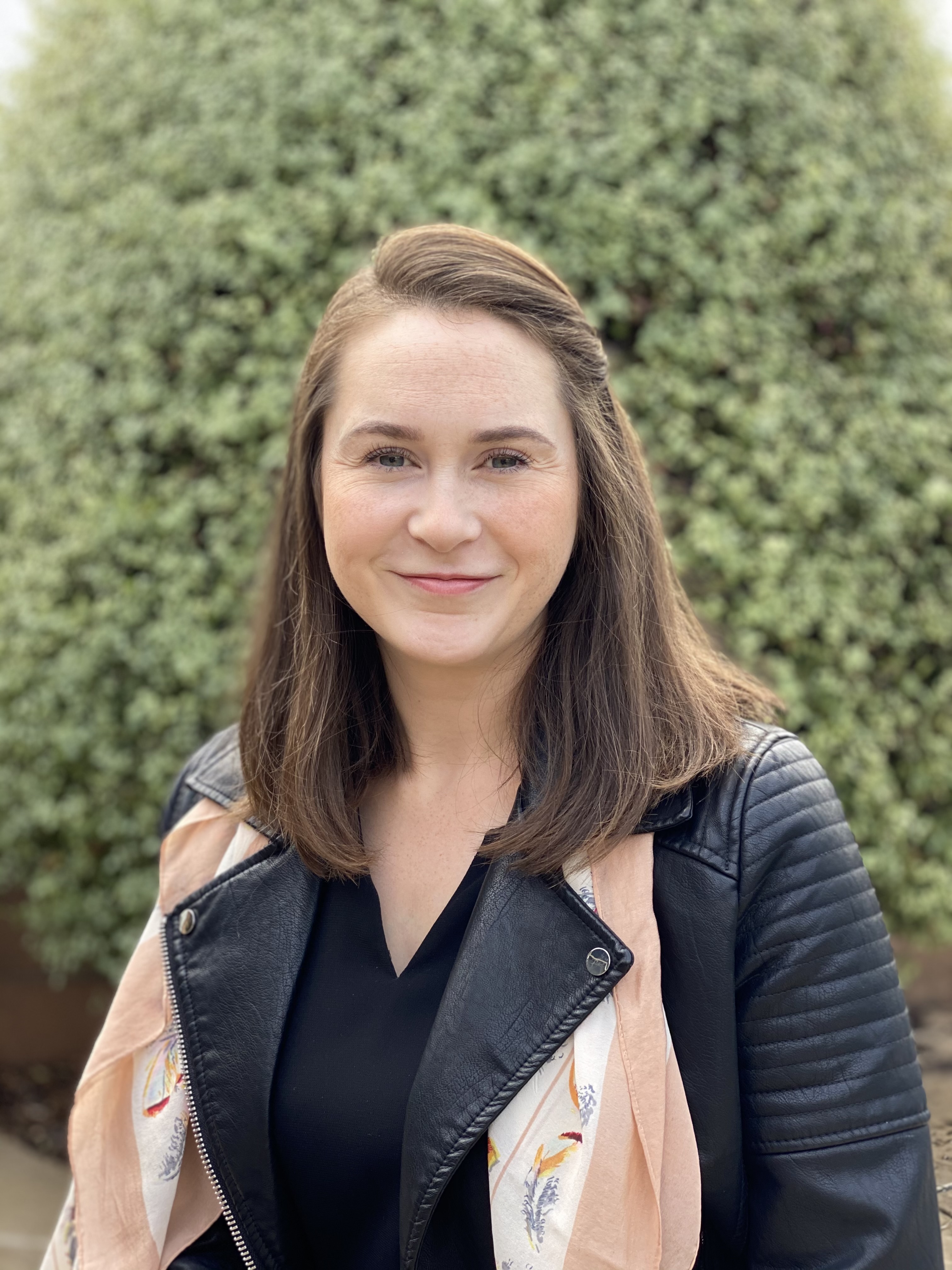
Leah Tubb

Samantha Emrick
